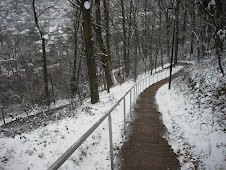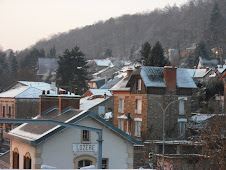Hazardous escape
by Timothée de Ferrières
The night was falling and Canh was still sitting on the strand. He enjoyed the moment because his fellow prisoners had walked away from the shore. As the strand streched a few meters below the esplanade, he almost felt alone : the only one who could see him was the guard in the watchtower that stood on the bank of the river a hundred meters upstream. He listened to the lapping of the water disturbed by the evening breeze, and he thought of his family.
If he were able to cross the river, he would walk and meet them again, whatever the distance. He had not seen them since he left home to join the resistance, two years before. He would have stayed if it had been possible, but he had had no choice. He remembered the verses he wrote a little while later :
(ref : The following translation does not render the rythm and the rhymes of the traditional-style original poem:)
For the very last time, I could stare at those lands,
That hundred-year-old alley where I used to play,
And those familiar roofs that used to shelter me
Like a precious treasure which had to be preserved.
In the middle of the gate, moved in their prayer,
Hopeful but so anxious to see their son going,
My family remained in the morning sunlight.
Their sorrow made my heart feel a pang of anguish.
I heard the soft singing of a luminous bird
With bright, coloured feathers that the sky set ablaze.
I breathed the air of the carambola trees
Whose gentle shadow I may never see again !
I carved deep in my heart this beloved picture
Which nothing, even time, will never alter,
And I carried away on that uncertain trip
Only a machete along with memories.
Canh dreamt of living a peaceful life on the land of the family as a small farmer, like his forefathers. Nevertheless, the trouble in the country prevented him from fulfilling that harmless desire. The regular army, which lacked combatants to fight against both a bordering country and the internal rebellion, had been making the rounds of the villages seeking recruits. When they arrived in a village, they gathered all the youngsters and they drew lots among them. They took away one young man out of every seven. Canh had been one of the unlucky ones. He was seventeen years old at that time.
He had had little time to get ready and to say his farewells to his family. They could not let him join the army. On the one hand, they rather agreed with the rebellion, but on the other hand, the family of the mother of Canh came from the country he might have to fight against. Therefore, he had to join the rebellion.
Hoi, a friend of the family helped the local rebellion group whenever they needed some food or tools. Canh knew him very well, so he had run to his village and met up with him. He explained his situation. Forunately, Hoi had to meet some rebels during the night, so Canh could quickly hide among them.
As Canh had never used a rifle, the rebels decided not to send him immediately into the combat areas. He was left in a one-eyed, old soldier's care to be taught the arms drill. When the others went to sabotage a bridge or an electric wire, Canh and the old man watched over the camp. During that time, Canh quickly learnt what he had to know, like how to use a gun or how to put up some explosives to fell a tree. Although he did not really like these activities, nor the idea he would have to fight, he was an assiduous apprentice. It kept his mind busy. He was fond of learning new things, and it made him forget his anxiety about his family, who might have been charged with having let him go.
A fortnight after he had left home, Canh was ready to take action. However, he was not yet able to take part to the particularly delicate actions. He and some other rebels were thus watching over the camp during a pitch-black night. Because they were not able to defend the camp alone, they had to stay motionless to avoid making any noise. Canh, however, eventually fell asleep. He woke up in the body of an army lorry. The camp had been taken by the army after the rebels were put to sleep by a lethargic gas. The lorry arrived before dawn at the prison where Canh was still a prisoner now, two years later.
The prison was a kind of camp quickly built to contain the guerilla fighters. It had more or less the shape of a square, in a bend of a large river. In this way, the river was used as a natural barrier, which simplified the building and the monitoring of the prison. The two other sides were blocked by rows of buildings and, beyond, by monitored walls. In the middle, a large multi-purpose esplanade was the only open-air area for the prisoners.
Actually, despite the ill treatments he had endured, Canh was not unhappy to be imprisonned. He did not have to fight for one or the other side, and he had more chance to survive. His health was sound and he had never been affected by the epidemics that sometimes ran through the prison. However, he did not know how long he would remain there. He hoped the rebellion would free the prisoners, but he feared the government had wearied of keeping many prisoners, in which case anything, he thought, could happen to them. They had to manufacture the army uniforms, but as the prisoner's numbers grew, the camp did not have enough work for everybody. Some prisoners were in charge of the maintenance of the prison, but many others had nothing to do all day long. Feeding these people was likely to have a high cost, too, Canh thought.
Canh above all missed his family. He did not even know what had happened to them after he disappeared. Were they still at home ? Had his elder brother joined the rebellion too, to avoid being enlisted ? Would he see them again ?
Night had fallen and Canh was still sitting on the strand. The river reflected the watchtower torch and Canh had the impression that a thousand stars were floating on the water. He would like to dive under those stars to cross the river and hide in the deep forest that bordered it. Once there, he would manage to find the way home.
A year before, a few months after his arrival, he had also wanted to cross the river. When he looked down the water, he had hesitated before the danger. The river was wide and fast and he was not a very good swimmer. He had eventually overcome his fears, and he was about to dive when he heard a soldier yell "Halt !". He turned round to see a rifle pointed at him. He had not dared dive in then because the river was too clear, and he could have been shot in the water.
"Get away from the river !" the soldier demanded, then added : "Get back to your barracks !" The soldier had found suspicious that a prisoner would be standing in front of the river for such a long time.
Canh had obeyed without a word. He was happy to have come out of that situation so well, in fact he was surprised not to be led to the head of the guards, who could have sent him to the block. However, this episode had worn down his desire to escape.
This day, Canh was remembering that story because, during the afternoon, he had noticed a prisoner who looked like the soldier who had prevented him from diving. He did not know how long that prisoner had been there, but he was convinced they were one and the same. He decided to talk to him the next time he would have the occasion to.
Two days later, Canh saw him again. He came up to him and his interlocutor confirmed he had in fact been a soldier. He was called Truong. Canh reminded Truong about his attempt at escape. Truong recalled having told Canh not to dive in. Canh asked him why he had become a prisoner.
"A few months ago, I was sent to another prison, as a guard. Last month, I did not shoot a prisoner who was escaping. I was charged with treason," Truong explained. He added in a hushed voice "I am neither in favor of the regime, nor of the rebellion, but I did not want to kill someone. I became a soldier because I was chosen by fate."
They kept silent a moment, looking at the river in the distance. Canh was troubled.
"Would you have shot me if I had dived ?" he asked.
"No."
Canh was taken aback by this answer. He thought, I could have escaped a year ago !
"Are there many guards like you ?" Canh asked again.
"Most of them, I think. But guards do not talk about that."
Canh was overwhelmed. Truong's revelationd meant that if Canh tried to cross the river, he would have a great chance to succeed. During the afternoon, he could not help imagining his arrival at home. That evening, he felt the need to write some words about it :
(ref : cf. note 1 above)
O enchanting instant ! Magnificent prospect !
The afternoon sun illuminates the landscape,
And I tread the ricefields that I was used to farm.
I recognize the earth that witnessed my childhood.
I already notice upon the horizon
The roofs of the village that appeared so often
In my dreams, in prison. I listen with pleasure
To the muffled stamping of the great buffalos.
The path to the house is no longer muddy
Since it has been paved with large, blueish flagstones.
I pick up a small carambola that has rolled
Along the embankment from the tree to my feet.
I finally arrive in sight of the house.
My little sister runs to meet me on the way ;
She has changed so ! Everyone is celebrating
What they have awaited : the family gathering !
Carried away by the idea that he could go back home, Canh resolved to try his luck that night. This time, he would not hesistate in front of the water to avoid to be spotted. Despite his excitement, he walked slowly towards the strand. When he reached it, he dived in straightaway.
The guard at the watchtower saw him dive. The water was clear enough to allow him to see Canh's shadow underwater. He followed the shadow with his rifle, and when Canh came up to breathe in the middle of the river, he fired twice. A bird took flight in a flurry of feathers, then the silence came back over the river.


Aucun commentaire:
Enregistrer un commentaire